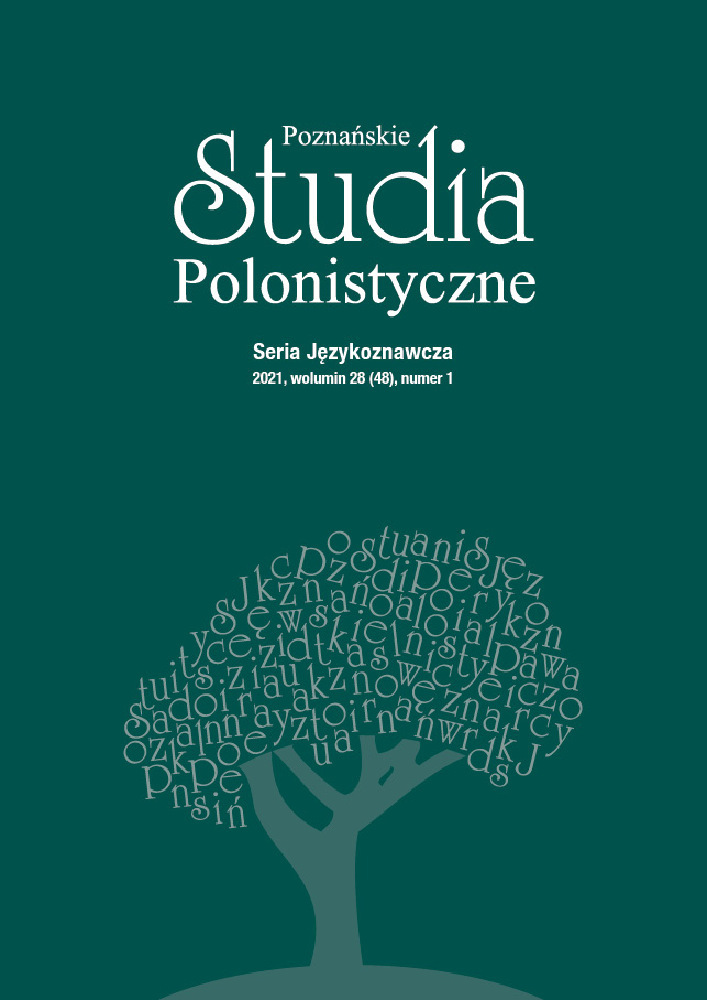Abstract
The aim of the article is to formulate a definition of linguistic crimes as a specific type of crimes penalised in Polish criminal laws and to categorise them according to the following criteria: the nature of the perpetrator’s enforcement activities; the use of language or failure to use it; the length of the linguistic enforcement activities; the authorship of statements; the nature of the legal good to be protected. Human behaviour, which is legally classified as a linguistic offence, is performative in nature and therefore has the legal effect of making the offender criminally responsible and of imposing criminal sanctions on him/her by the competent state authorities. In the article, the performative function of language will be extended to include the notion of passive performativity, resulting from an offence committed as a result of the failure to use language in situations where its use is required by the legal system.
References
Źródła (wraz ze stosowanymi skrótami)
k.k. – Ustawa z dnia 6 czerwca 1997 r. Kodeks karny, Dz.U. Nr 88, poz. 553 z późn. zm.
k.k.s. – Ustawa z dnia 10 września 1999 r. Kodeks karny skarbowy, Dz.U. Nr 83, poz. 930 z późn. zm.
Literatura
Austin John (1993), Mówienie i poznawanie. Rozprawy i wykłady filozoficzne, przeł. Bohdan Chwedeńczuk, Warszawa.
Bojarski Marek, Giezek Jacek, Sienkiewicz Zofia (2020), Prawo karne materialne. Część ogólna i szczególna, Warszawa.
Everett Daniel (2018), Język jako narzędzie kultury, Kraków.
Gardocki Lech (2019), Prawo karne, Warszawa.
Konarska-Wrzosek Violetta, Marek Andrzej (2019), Prawo karne, Warszawa.
Kurzowa Zofia i in. (2008), Słownik synonimów, Warszawa.
Morawski Lecz (2004), Wstęp do prawoznawstwa, Toruń.
Nazar-Gutowska Katarzyna (2012), Groźba bezprawna w polskim prawie karnym, Warszawa.
Pieńkos Jerzy (1999), Podstawy juryslingwistyki. Język w prawie – prawo w języku, Warszawa.
Stanik Jan (2013), Psychologia sądowa, Warszawa.
Stefański Ryszard, red. (2020), Kodeks karny. Komentarz, Warszawa.
Wróbel Włodzimierz, Zoll Andrzej (2014), Polskie prawo karne. Część ogólna, Kra¬ków.
Zagrodnik Jarosław i in. (2019), Proces karny, Warszawa.
Zieliński Maciej (2017), Wykładnia prawa. Zasady – reguły – wskazówki, Warszawa.
License
Authors
The Author declares that they are entitled to personal and property (material) copyrights to their work published in “Poznańskie Studia Polonistyczne. Seria Językoznawcza”, and that these rights are not limited by the terms of Author’s agreement. The Author warrants the originality, authorship, and sole ownership of all rights to the Work, and affirms that they have the right to grant all kinds of licenses hereinabove without infringing on the intellectual property rights of any third party, including personal rights.
The Author(s) retains copyright to their article and the right to freely dispose of the work, granting Adam Mickiewicz University in Poznań a non-exclusive, royalty-free licence under the Attribution-NoDerivatives 4.0 International (CC BY-ND 4.0) Creative Commons licence to use the Work without territorial restrictions for an indefinite period in the fields of use designated in the Author’s agreement.
Users
Interested Internet users are entitled to use works published in „Poznańskie Studia Polonistyczne. Seria Językoznawcza” since 2016 under the following conditions:
- attribution - obligation to provide, together with the distributed work, information about the authorship, title, source (link to the original work, DOI) and the license itself.
- no derivatives - the work must be preserved in its original form, without the author's consent it is not possible to distribute the modified work, such as translations, publications, etc.
Copyrights are reserved for all texts published before 2016.
Other
Adam Mickiewicz University in Poznań retains the right to the journal as a whole (including its layout, graphic design, title, cover design, logo and more).

